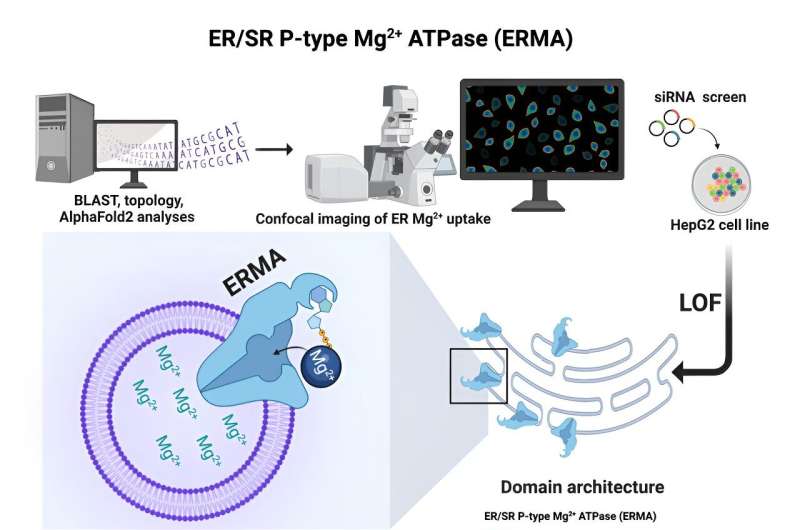This article has been reviewed according to Science X's editorial process and policies. Editors have highlighted the following attributes while ensuring the content's credibility:
fact-checked
peer-reviewed publication
trusted source
proofread
Study discovers how a magnesium cellular transport 'pump' plays a vital role in cardiac function

Magnesium is a mineral critical to a wide range of biological functions, and a new study takes aim at how it's transported to address cardiac dysfunction and other diseases, opening new possibilities for treatment.
The study led by researchers at The University of Texas Health Science Center at San Antonio (UT Health San Antonio), and published in the journal Molecular Cell, charts a new course in explaining how a novel protein called ERMA—a long-time mystery—functions as a precision-engineered pump in guiding magnesium.
The investigation reveals how disruptions in ERMA's function can lead to significant disturbances in how heart cells manage calcium, crucial for the rhythmic contractions of the heart muscle. These imbalances can lead to cardiac dysfunctions, particularly affecting the heart's relaxation phase and its ability to efficiently refill with blood.
"Our findings propose that targeting ERMA and its regulatory networks could open new therapeutic avenues for heart conditions, highlighting the critical need for precise magnesium management within heart cells to maintain a stable calcium balance," said Madesh Muniswamy, Ph.D., MS, professor of medicine and director of the Center for Mitochondrial Medicine, Division of Cardiology, at the Joe R. and Teresa Lozano Long School of Medicine at UT Health San Antonio.
Muniswamy is lead author of the study, titled, "ERMA (TMEM94) is a P-type ATPase transporter for Mg2+ uptake in the endoplasmic reticulum," published March 20 in Molecular Cell. Co-authors also are with the Department of Medicine/Center for Mitochondrial Medicine at UT Health San Antonio, as well as with the University of Pennsylvania; Columbia University; Western University in London, Ontario; and the National Human Genome Research Institute at the National Institutes of Health.
What is ERMA?
ERMA is an acronym for ER Mg2+ ATPase, with ER referring to the endoplasmic reticulum, or a network of membranes inside a cell through which proteins and other molecules move. It serves many roles in the cell including calcium storage, protein synthesis and lipid metabolism, and the new discovery reveals a magnesium reservoir.
Mg2+ represents magnesium ions and ATPase is an enzyme that converts stored chemical energies into mechanical actions within the cell.
Muniswamy said the new study sheds light on longstanding mysteries surrounding cellular magnesium transport, setting the stage for groundbreaking inquiries into implications for a wide range of diseases, with a particular focus on cardiac health.
Building on prior research that connected ERMA mutations to neurodevelopmental delays and congenital heart defects, the study explains ERMA's vital role in cellular biology, delving into its critical function in transporting magnesium into the endoplasmic reticulum, unveiling its indispensable role in cellular physiology and organ function.
The process of decoding cellular magnesium transport was not without its hurdles, he said, given the mineral's ubiquitous involvement in more than 300 enzymatic reactions and its essential role in processes like DNA synthesis and energy metabolism.
The complexity was further magnified by the need to distinguish specific transport pathways amid a backdrop of widespread cellular functions and the initial lack of precision in tools available for tracking magnesium's intricate movements within cells.
A standout insight from the study was ERMA's profound impact not just on cardiac health but other organ systems as well.
"By providing novel insights into the cellular underpinnings of cardiac dysfunctions related to magnesium regulation," Muniswamy said, "our work represents a significant leap in cellular biology and cardiology."
More information: Neelanjan Vishnu et al, ERMA (TMEM94) is a P-type ATPase transporter for Mg2+ uptake in the endoplasmic reticulum, Molecular Cell (2024). DOI: 10.1016/j.molcel.2024.02.033


















